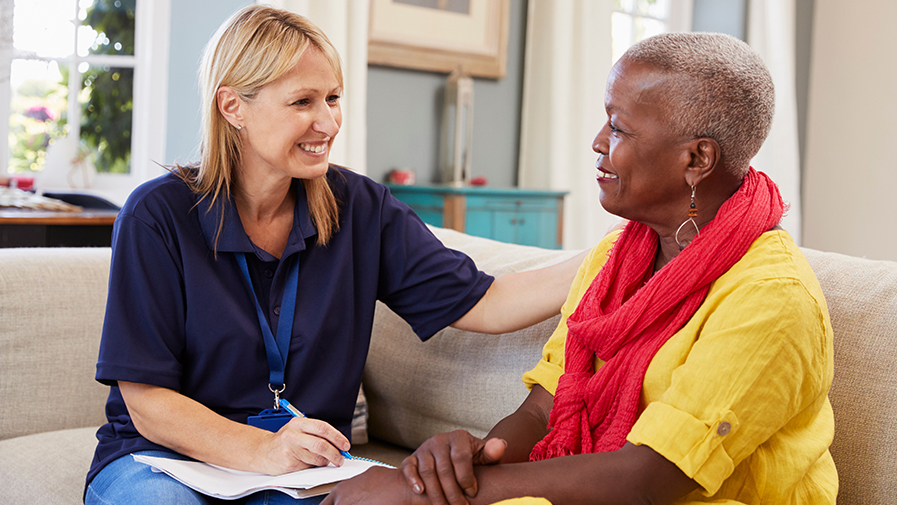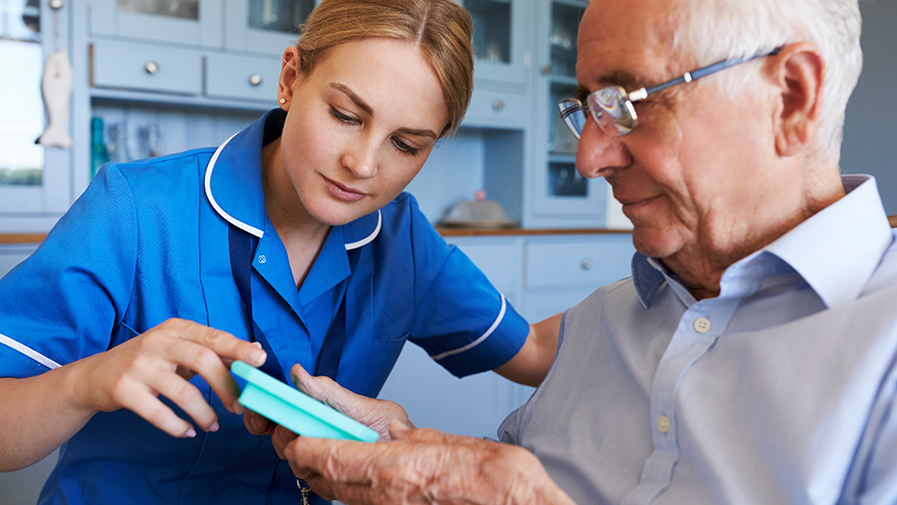“How do carers get trained?” It’s a question we hear often. Here, we talk to a Bluebird Care trainer, and a carer who’s recently completed their training.
First, however, it makes sense to cover some of the other common questions we get asked about training to be a care assistant.

Can you be a care assistant with no experience?
You can! While many of our Bluebirds come to us having been a carer elsewhere or looked after a loved one, you can absolutely learn the ropes from scratch thanks to our comprehensive training induction and probationary period.
How long is training for care assistants?
We run an initial three-day practical workshop, with an additional 15 modules of e-learning – each of which take around 15-20 minutes to complete. After training, our care assistants work at least three shadow shifts following other experienced carers, then have a 12-week probationary period before they become a fully qualified Bluebird Care Assistant!

A carers experiences during training: Elias (Carer Trainer)
Elias oversees and helps to give training to our trainee care assistants here in Bluebird Care Bournemouth & Poole. He’s new to the role, and was happy to share how the training is structured and his experiences with it so far.
“The training is divided into practical and theory, including reviewing our culture, policies and procedures, the role of a carer, and what our carers can expect from us in terms of support, career pathway and professional development.
“After the probationary period our qualified carers get a bonus, then they can apply for a qualification like an NVQ, courses from Social Care TV, or in specific areas like dementia or diabetes – it all depends on what they want to develop.
“Some of the specific topics we cover include health and safety, infection control, and how to give practical personal care – including administering medication.
“There is also basic life support, where our carers practice with a manikin, and moving and handling training, where we teach them techniques they should and should do. We have special equipment for that including a hoist and wheelchairs. We use a colleague rather than a dummy so people can feel what it’s like to move the hoist, for instance.
“It’s quite a comprehensive training course, and after that our trainees complete e-learning training, which gives them the care certificate to pass probation. Some may do those in the first month of their probation. Others may take the full three months – our trainees can take it at their own speed.
“During their probation our trainee carers will be paired with a supervisor who they will catch up with once a week – just to make sure they feel supported and can ask any questions they have. After they pass their probation, that moves to once a month. That support never goes away.
“We also have mandatory training that all of our carers need to refresh themselves on once a year. The main two are basic life support, and moving and handling; those are the only two with a practical component which we do here in the office. The other modules also need to be refreshed, but they can be done on the e-learning platform.
“I love giving training. In fact, one of our experienced carers who recently took a refresher told me she found it more in-depth this time because of how we’ve changed things recently – which is always nice to hear!
“The training also gives our colleagues a chance to meet each other, talk about the job, and catch up if they haven’t seen each other in a while. We’re like a family here and that’s a very important part of our culture. I really enjoy how our training helps to facilitate that.”

A carer’s experiences during training: Lisa (Care Assistant)
Lisa has been with us for just over 12 weeks and sat down to speak to us just as she’d passed her probation – the very day she received her care assistant qualification! She was delighted to take us through her experiences with training at Bluebird Care Gosport & Poole.
“The training was very informative – they worked at our pace and it was broken down into segments, which was really helpful. It was quite full-on in those first three days, but we had plenty of breaks in between sessions and we had time to answer questions – and if we didn’t understand something, Elias and the other trainers took time to go through it with us.
“On the practical side I love that everyone had a chance to take turns doing each action – whether it was personal care on manikins, or using the hoist in the manual handling module. We all had a chance to be both the client and carer, which really helped us understand things from the customer’s perspective.
“I’d actually never been a carer before, so for me personally it was a lot to take in, but I really enjoyed it. I’d worked in admin before and I really wanted to do something completely different. So I went onto Indeed and searched for jobs, and Bluebird got back to me within a few hours – which I’d never had before!
“It’s funny because I’d never thought of myself as empathetic, and I’d never considered working in care before. But being here has actually changed my life. I’m much happier in my mental health, and I’ve really surprised myself. I really enjoy being around the people – whether it was meeting people in the training, or going to the customer’s homes.
“The training gave me the support and knowledge I needed to do the job well. I’d never helped get someone out of bed before, so if you’d asked me to do that without the training, I’d either have been hurting myself or hurting them. Now I know how to do it safely and help to make the customers’ experience with a carer as comfortable as possible.
“It also helped me to understand the importance of communication. I try and think how my customer is thinking, but I also talk to them to let them know what I’m doing – especially with clients who might have dementia. It’s like a running commentary that just helps them to understand what’s happening. And it’s amazing how it’s become second nature, knowing which customers might really benefit from that.
“It’s funny though because in some ways, the real training starts when you go out on your own. I was quite nervous when I first did that, but I’ve gotten the hang of it now. And it’s definitely reassuring to know there will be more training in future! I’m actually going to do a refresher on hoisting soon, just to add to my confidence with it.
“Now I’ve got my care certificate I’ve been asked if I’d like to do any specialist courses, and I chose to do the incontinence course. I’m really looking forward to it! It’s going to make me a specialist in dealing with customers who are incontinent, and as well as having a higher salary, I’ll also be able to take in-house training and workshops talking to other carers. So having just taken the training, now I’ll get to be a part of it – helping our carers understand how to deal with incontinence, and also how our customers and their families might be feeling going through it.
“The whole last three months has really been a whirlwind and I can’t believe it. I’m happy to say that I’m going in a direction I love.”

Considering becoming a carer?
We’re always on the lookout for people with the caring bone in their body – even if, like Lisa, they didn’t realise they had it!
If you’re curious about a career in care, get in touch with us to find out if it could be for you, or visit our careers page to see our open carer roles in the Bournemouth and Poole area.





